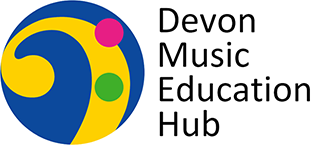Devon Music Education Hub (the Hub) believes all children and young people should have equal access to music and be able to fulfil their musical potential. Ultimately, this means ensuring equality, diversity and inclusion is embedded across all areas of Hub delivery, including parity of opportunity for all children and young people, regardless of race, gender, where they live, their levels of talents, parental income, whether they have special educational needs or disabilities, and whether they are Children in Care. We acknowledge that, while we have made significant progress on our inclusion journey, we need to do more to put Talk Into Action and ensure all children and young people have equal access to music. This strategy seeks to address this but is envisaged as a live, ongoing, rolling programme of iteration through dialogue with stakeholders.
Musical Inclusion is about removing barriers to ensure all children enjoy full participation in a music education which supports the development and achievement of each young person based on their individual abilities, needs and interests.
Our approach will be underpinned by the acronym, HEARD, developed by national funder Youth Music as a useful tool for Hubs to use when reflecting on where they are and on how they are progressing on their inclusion journey:
-
H
Holistic
People facing the biggest barriers receive the most support
-
E
Equitable
Placing emphasis on personal, social, and musical outcomes
-
A
Authentic
Developed with and informed by the people we do it for
-
R
Representative
The people we work with as participants and colleagues reflect our diverse society
-
D
Diverse
All musical genres, styles, practices are valued equally
The children and young people who most need the Hub to establish a long-term, sustainable offer that makes sure all children have equitable opportunity to make, create and enjoy music include (but are not limited to):
- Disabled and neurodiverse children and young people, and those with additional needs.
- Children and young people living in rural isolation, in areas of social and economic deprivation, or where there are issues around differing cultural heritage.
- Children and young people who bully or are being bullied, who live in state or foster care, refugees, migrants, asylum seekers.
- NEET children and young people (not in education, employment, or training), homeless or at risk of homelessness.
- Children and young people with behavioural, emotional, and social difficulties, including those who become excluded from mainstream school.
The key identified priorities for the Equality, Diversity, and Inclusion Strategy, are as follows. They are interrelated and are not written in order of importance:
Priority #1: Increasing the relevance of the Hub offer to children young people
This is about young people seeing the music offer in their locality as meaningful, attractive, and connected to themselves and their lives and circumstances, right now.
Priority #2: Improving communication, visibility, and reach
Creating clear signposting and lines of communication, highlighting the Hub offer, to ensure that a diverse and inclusive music offer is visible to all children and young people.
Priority #3: Removing financial barriers
Learning to play a musical instrument can be expensive. Our charging, remissions and subsidy policy sets out the support available from the Hub and elsewhere for children and young people from low-income backgrounds.
Priority #4: Increasing confidence and skills of workforce
We want to increase awareness, skills, and confidence of the formal and non-formal workforce in planning, delivering, and evaluating music opportunities, particularly in relation to disabled and neurodiverse children and young people, and those with additional needs.
Priority #5: Promoting positive attitudes towards the benefits of music
This is about increasing understanding of the benefits of music across young people’s development needs. It is also about increasing community engagement in the ongoing design and development of the Hub offer.
Priority #6: Enabling inclusive practice with practical resources, including instruments
Developing the existing instrument loan provision and digital resources to best support inclusive practice, particularly in relation to disabled and neurodiverse children and young people, and those with additional needs.
Priority #7: Addressing practical barriers to engagement, including transport and accessibility
Ensuring that the Hub offer addresses practical barriers to engagement, such as rural isolation, poor transport links, and limited mobility between areas of social and economic deprivation.
Priority #8: Putting inclusion first across the Hub
This priority is about developing and embedding the ethos of ‘inclusive practice is best practice’ across all aspects of Hub work, including governance.
Priority #9: Harnessing, supporting, and collaborating with the expert inclusive practice that exists in Devon and Torbay
Capitalising on the significant work of expert practitioners, and inclusion-focused partnerships that have already established locally, including voluntary sector partners.
Devon Music Education Hub would like to thank strategic partners Daisi for their support with developing our Equality, Diversity, and Inclusion Strategy.
